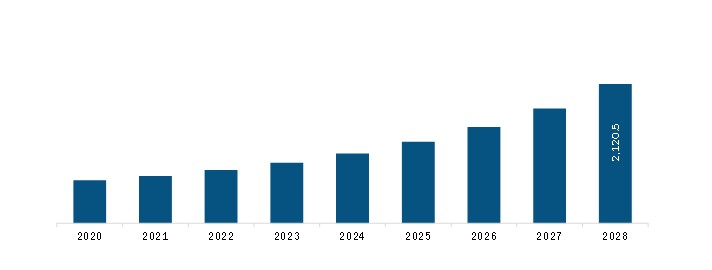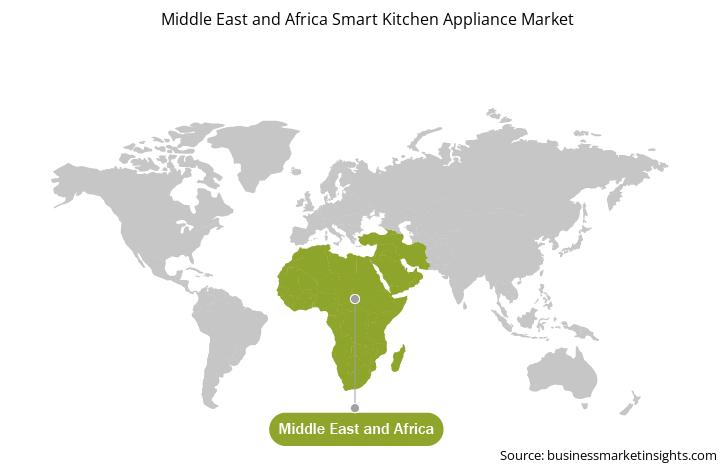Market Introduction
The smart kitchen appliances products encompasses set of consumer kitchen appliances and electronics exclusively designed for commercial and/or residential cooking requirements. The key differentiating factor between the conventional and smart kitchen appliances is that the later utilizes the application of any technology driven solutions or features that facilitates in enhanced consumer experience for its customers compared to the conventional kitchen appliances.
Strategic insights for the Middle East and Africa Smart Kitchen Appliance provides data-driven analysis of the industry landscape, including current trends, key players, and regional nuances. These insights offer actionable recommendations, enabling readers to differentiate themselves from competitors by identifying untapped segments or developing unique value propositions. Leveraging data analytics, these insights help industry players anticipate the market shifts, whether investors, manufacturers, or other stakeholders. A future-oriented perspective is essential, helping stakeholders anticipate market shifts and position themselves for long-term success in this dynamic region. Ultimately, effective strategic insights empower readers to make informed decisions that drive profitability and achieve their business objectives within the market. The geographic scope of the Middle East and Africa Smart Kitchen Appliance refers to the specific areas in which a business operates and competes. Understanding local distinctions, such as diverse consumer preferences (e.g., demand for specific plug types or battery backup durations), varying economic conditions, and regulatory environments, is crucial for tailoring strategies to specific markets. Businesses can expand their reach by identifying underserved areas or adapting their offerings to meet local demands. A clear market focus allows for more effective resource allocation, targeted marketing campaigns, and better positioning against local competitors, ultimately driving growth in those targeted areas.
Middle East and Africa Smart Kitchen Appliance Strategic Insights

Middle East and Africa Smart Kitchen Appliance Report Scope
Report Attribute
Details
Market size in 2021
US$ 755.7 Million
Market Size by 2028
US$ 2,120.5 Million
Global CAGR (2021 - 2028)
15.9%
Historical Data
2019-2020
Forecast period
2022-2028
Segments Covered
By Product
By Connectivity
By End User
Regions and Countries Covered
Middle East and Africa
Market leaders and key company profiles
Middle East and Africa Smart Kitchen Appliance Regional Insights

Market Overview and Dynamics
The Middle East and Africa smart kitchen appliance market is expected to reach US$ 2,120.5 million by 2028 from US$ 755.7 million in 2021; it is estimated to grow at a CAGR of 15.9% during 2021–2028. A few of the major factors contributing to the market growth include cost-effectiveness and communication ability of smart kitchen appliances, and availability of superior internet connectivity across Middle East and Africa. However, vulnerability to cyber-crimes and higher upfront costs restrict the market growth.
Smart kitchen appliances are recent technologies that are gaining prominence in developed countries. According to the Cisco Internet Report, connected homes will hold a share of 48% across all the Internet of Things (IoT) applications. The use of smart lighting, smart locks, and thermostats is prominent in Middle East and Africa region. Smart kitchen appliances benefit end users through cost-effectiveness, communication ability, and safety and convenience. The initial investments toward the procurement of smart kitchen appliances are on the higher side; however, in the long run, these appliances help customers reduce costs associated with periodic maintenance and energy consumption. The traditional or modern electronics or electrical appliances conserve less energy; however, they require periodic maintenance, incurring high costs. The integration of sensor technologies in smart kitchen appliances enables the devices to sense the performance and alert the owners in case of any faults. This factor reduces the repetitive costs. LG ThinQ is a smartphone application offered by LG Electronics for its smart appliances, which feature self-diagnosis abilities; the diagnosis results can be accessed by end users using the LG ThinQ application. Further, the application provides necessary troubleshooting instructions to users to diagnose problems, which eliminates the need to contact repair personnel for minor problems. Another advantage of smart kitchen appliances is their ability to communicate with each other over wireless networks. Users can also communicate with these appliances through their smartphone applications. As a result, smart technologies enable the owners to control, monitor, and access the appliances remotely. Smart kitchen appliances such as smart ovens allow them to switch off or on the stove from their smartphones. The integration of various sensors and built-in cameras with smart refrigerators also allows the owners to update the shopping list with ease. Smart refrigerators have screens that are used as notepads as well as to check temperature and energy consumption patterns. The owners of smart refrigerators can easily control and manage the refrigerators according to the refrigerator's performance and switch between various modes through smartphones. These advantages of smart refrigerators are propelling their popularity in commercial and residential sectors.
The COVID-19 pandemic has severely affected the Middle East and Africa smart kitchen appliances market due to the disruption of electronics and resource supply chains. This led to significant revenue losses for the smart kitchen appliances manufacturers and distributors in 2020 offering their products in the MEA. Moreover, the region experienced a decline in overall GDP, which marginally affected the smart kitchen appliances market from the demand side in 2020. However, as the region showcased a positive trend in terms of the adoption of advanced electronics from the beginning of 2021, the consumer electronics supply chain experienced stable dynamics.
Key Market Segments
Based on product, the Middle East and Africa smart kitchen appliance market is segmented into smart ovens, smart refrigerators, smart sous vide, smart juicers & blenders, smart cookers & cooking robots, smart cooktops, smart integrated ovens and cooktops, and others. The others segment includes smart dishwashers and smart coffee vending machines. In 2021, the smart refrigerator segment held the largest share of the market, and it is expected to register the highest CAGR during 2021–2028.
Based on end user, the Middle East and Africa smart kitchen appliance market is segmented into commercials and residential. In 2021, the residential segment held a larger market share. The market for this segment is expected to grow at a faster CAGR during 2021–2028.
Major Sources and Companies Listed
A few of the market players profiled during the study of report on the Middle East and Africa smart kitchen appliance market are Electrolux AB, BSH Hausgeräte GmbH and GE Appliances.
Reasons to buy the report
MIDDLE EAST AND AFRICA SMART KITCHEN APPLIANCE MARKET SEGMENTATION
By
Product
By
Connectivity
By End User
By Country
Company Profiles
The Middle East and Africa Smart Kitchen Appliance Market is valued at US$ 755.7 Million in 2021, it is projected to reach US$ 2,120.5 Million by 2028.
As per our report Middle East and Africa Smart Kitchen Appliance Market, the market size is valued at US$ 755.7 Million in 2021, projecting it to reach US$ 2,120.5 Million by 2028. This translates to a CAGR of approximately 15.9% during the forecast period.
The Middle East and Africa Smart Kitchen Appliance Market report typically cover these key segments-
The historic period, base year, and forecast period can vary slightly depending on the specific market research report. However, for the Middle East and Africa Smart Kitchen Appliance Market report:
The Middle East and Africa Smart Kitchen Appliance Market is populated by several key players, each contributing to its growth and innovation. Some of the major players include:
The Middle East and Africa Smart Kitchen Appliance Market report is valuable for diverse stakeholders, including:
Essentially, anyone involved in or considering involvement in the Middle East and Africa Smart Kitchen Appliance Market value chain can benefit from the information contained in a comprehensive market report.